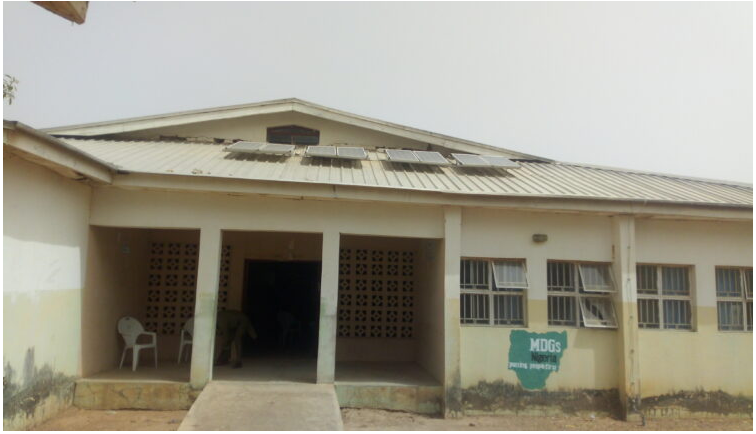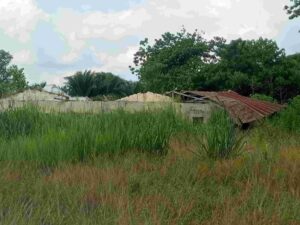Solacebase in this report uncovered how residents of Hugulawa and Marga in Bichi LGA, two communities that border Katsina states prefer to travel about 11 kilometers on motorcycle to Bichi town where they can eventually buy drugs and receive treatment or resolve to herbs, a practice capable of increasing their health condition, according to medical experts.
When 12 weeks pregnant Aisha Usman in Hugulawa in Bichi LGA got ill and needed to be rushed to the clinic one Tuesday night in January 2022, her husband was bewildered and did not know what to do. The clinic is located just within their community Hugulawa, but there was no health worker or midwife to attend to Aisha when they arrived at the clinic, Usman’s only option was to transport his wife to Bichi town which is located about 9 kilometres away from Hugulawa, and they had no vehicle for transportation.
Aisha endured the pain through the night while she was provided some herbs to drink to reduce her pain before morning, while it was daybreak when Hugulawa clinic was opened and workers were already resuming work, Aisha was rushed to the clinic where she was immediately referred to Bichi because there was no drug in Hugulawa to administer to her.
“It was devastating seeing my wife so weak, we were helpless, with no vehicle for transportation, I took her home and we began to administer our local herbs on her, and for some weeks she became well until close to the election period, her health resurfaced.
“We rushed her to the hospital and it was still the same complaint no drugs and injection, so immediately borrowed a motorcycle and rushed to Bichi town which took me about 10 kilometers, I got the injection and drug but before my arrival, my wife already had a miscarriage, that was how she lost the pregnancy, and we just used the same local herbs to flush the remaining blood out of her system.
In Nigeria, PHC centers, Basic Health Clinics (BHC), and Comprehensive Health Centers (CHC) deliver PHC services, with over 30,000 of these facilities spread across 9,565 Wards in 774 Local Government Areas. With oversight by the Local Government Authorities (LGAs), majority of these facilities are in rural, under-served, and hard-to-reach areas to ensure equity and access to health services.
The blueprint of the National Primary HealthCare Development Agency (NPHCDA) requires that a standard PHC has at least a medical officer, a community health officer, four nurses or midwives, three community health extension workers, a pharmacy technician, six junior community health extension workers, one environmental officer, one medical records officer, and one laboratory technician.
At the barest minimum, the agency expects all PHCs to have supporting staff, two health assistants; two security personnel, and two general maintenance staff.
Hugulawa PHC which is in a pitiable state, a far cry from the standard requirement of a PHC, residents still live at the mercy of their own pocket to buy drugs with no doctor to attend to patients. Currently, Nigeria has a doctor-to-patient ratio of one doctor to 5,000 patients instead of the one-600 ratio recommended by the World Health Organization (WHO).
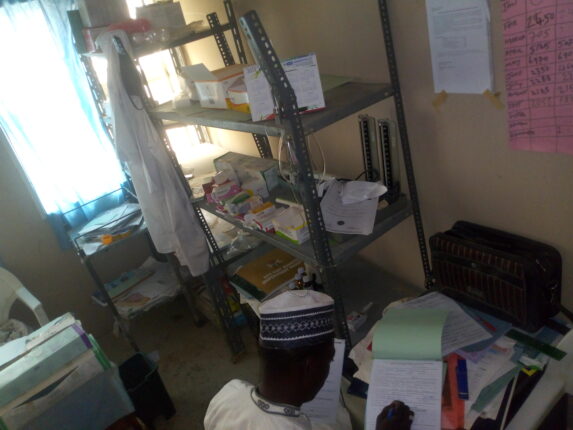
Inside view of Hugulawa PHC
In 2022, Ibrahim Danjuma, a motorcycle accident victim needed to be administered an anti-tetanus injection or drug to avoid contracting infection during the accident, while at Hugulawa clinic there was nothing as such to be administered, his brother had to travel to Bichi town to get the injection before he could be administered the tetanus injection.
“We lost Ibrahim in November 2022, to this tetanus infection which he contracted during a motorcycle accident, because he was not administered on time and it took several hours before he was given the injection, the infection already spread. When his situation got worse and the leg was oozing out blood, we took him to the National Orthopedic Hospital, Dala in Kano metropolis that was where they confirmed it was tetanus and that it had eaten deep into his leg, it was just on our third day of visiting Dala that he died, Mohammed Danjuma said.
The case of Bala Ahmed is a fresh incident in the mind of his family, he had the opportunity to survive, but because they could not afford to buy drugs from the pharmacy, he was left to consume local herbs which cost his life.
“Bala was placed on herbs which we have always known can be used to cure typhoid, we resolved to this because whenever we visit the hospital they will prescribe drugs for us to go and buy or give us just painkillers to take, as his health deteriorated, we resolved to herbs and it was then we realised that his health has gone beyond what we expected, it was just when we were set to take him to General hospital that he died on the way,” Umar Ahmed, Bala’s elder brother narrates.
Sulaiman Halilu, the Officer in Charge of Hugulawa PHC while lamenting the condition of the health facility to Solacebase, described the health facility as a forgotten one.
“We are just here as health workers in this facility, and we are expected to work 24 hours round the clock, that is not possible, we just work as stated in our offer letter, it is the responsibility of the government to increase the number of staff in each health facility.
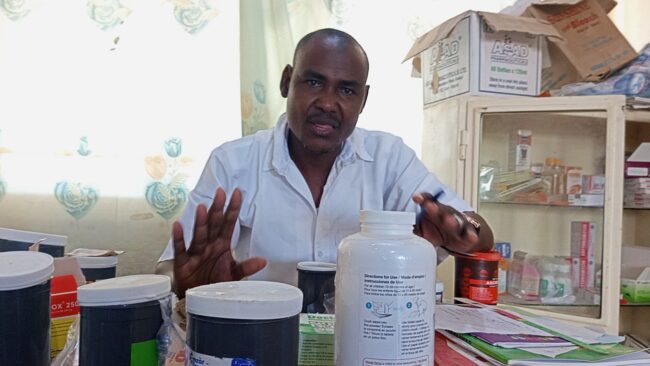
Sulaiman Halilu, the Officer in Charge of Hugulawa PHC, his office serves as the pharmacy of the health facility
“It is sad that we have to explain to patients always that there are no drugs to treat them or injections to administer to them, this is a peculiar problem in so many PHCs in Bichi. Patients will have to buy their own drugs or injections before they can be treated, with such conditions, you should expect lives to be lost.
“We have raised complaints from the local government level and I can tell you that 2022 was a terrible year, we were completely isolated and ignored, with no supply of drugs or anything, I felt most for pregnant women, who had to survive managing the little drugs on ground, so many stopped coming to the Hugulawa health facility.
Dahiru Sani, the village head and the WDC chairman of Hugulawa ward, described government efforts at the health facility in the last 5 years as total neglect, adding that the state of the health facility operating without staff and supply of drugs, leaving residents at the mercy of herbal medicine is a complete risk.
“On several occasions, I have raised concern as regards this challenge at our LGA meeting, it then looks like the more i talk, the more we get neglected, this has become of great concern to me and I am happy you came around to speak to us directly, no media has ever come here to cover our problem, I just hope this administration will act swiftly and help us with the supply of drugs as it should be,” Sani told Solacebase.
Inside Marga PHC
It was a similar scenario in Marga PHC located in Marga community about 7 Kilometers from Hugulawa PHC, where residents also rely more on herbal medicine to treat any ailment.
Yunusa Abdulsalam a father who is also a farmer, narrates his ordeal as a terrible one, stating the distance they will have to travel to get drugs.
“No one desires the kind of life we are living here in Marga, we don’t have light, road, or even good schools for our children, yet, we can’t afford to receive good medical care in our own community, it is worse because we need to buy drugs when we are sick, this is because the health facility cannot provide these drugs because they don’t have it.
“The two options always before us when our children are sick is either we rush to the farm, get a combination of roots and leaves then boil them and give them to drink, and so we also administer to ourselves when we are sick,” Abdulsalam said.
Like Abdulsalam, Fauziya Hamza the mother of 3 and a widow described how one of her son contracted cholera which almost killed him, but she is still grateful for the herbs that was recommended and administered to him which helped him to recover.
“Cholera is a common and annual occurrence in Bichi LGA as a whole, sadly, when my son contracted it, it was like he was going to die, he was rushed to the health facility which then asked us to take him to the General Hospital in Bichi, it was then my late husband brother recommended that we cook some leaf which he got for us and then bath him with it as well as drink some of the herbs prepared for him, this was how we treated him without spending any money to buy drugs,” Hamza said.
Nura Sabo, the ward head of Marga community could not hold back his pain as he explained to Solacebase how hard it is for residents of Marga community to receive good medical care and also how most families have normalised the use of herbs.
“I have always said this, living in the village is like a curse, you will completely be left out of everything, I understand that our health facility is not as big as others across the country, but we deserve to receive what they are receiving either from the state or federal government, unfortunately, drugs that is suppose to be supplied to rural residents for free are not even made available for them, how do you expect them to cope knowing fully well that they will be sick and need to take medication to get well.
“It has been over 4 years of difficult time for both the health workers who are incapacitated and residents who cannot afford to get drugs, the only drugs you see them supply are those drugs meant for pregnant women, that I can tell you they supply most times, but for other sick patients, it’s been a total blackout,” Sabo said.
Kabir Mohammad, the officer in charge of Marga PHC, expressed the same feeling as Sabo, the WDC whom he reports the state of the facility as a procedure.
“If you have met with the WDC, whatever he tells you is how it is, we are here but as a civil servant, there are limits to what I can tell you, but for him, he will say it just as it is. We are now consoling the people instead of treating the people by providing the necessary drugs and treatment they require, unfortunately, as small as a pain reliever, there are times we will stay for about 4 months before we get these drugs, and this is even because they bring some for ANC patients, not for all patients.
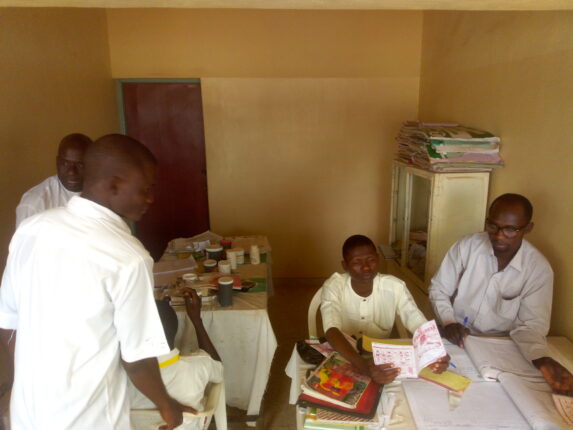
Kabiru Mohammad, the officer in charge of Marga PHC, in glasses, and other volunteers supporting the health facility.
“If I had my way, I would have long quit this job, it’s not as rewarding as I expected, we work and end up spending our own money in the process, this is totally wrong, we are aware residents make use of herbal medicine, while we educate them about the side effect, but that’s their only option, not all can afford to travel to Bichi just to go and buy drugs.
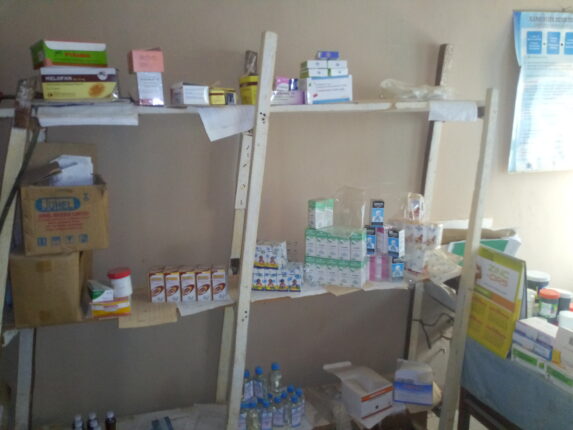
Inside view of Marga PHC section
Huge Budgetary Investment For Drug Supply
Records from the Kano State health budget between 2020 to 2022 and its 2022 health profile report have revealed the huge financial investment spent on drug supply to health facilities in the state, despite this figure, PHCs, and residents are forced to buy their drugs from out of pocket, leaving community residents who can not afford to buy drugs at the mercy of herbs, a traditional practice inflicting more damages on the health of rural residents.
A cursory look at the amount invested by the Kano State government for the supply of drugs to PHCs. Between 2020 to 2022, the Kano state government claimed to have spent a total of 6 billion as amount expended in the supply of drugs to health centers across the state.
For instance, in 2020, a total of N1.2 billion was the amount claimed to have been spent by the Kano State government as money used for the supply of drugs across health centers. Similarly, in 2021, the figure increased to N2 billion while in 2022, the Kano State government claimed to have spent a total of N2.8 billion for the supply of drugs across its health centers.
Medical Equipment Standard List for PHCs
Health standards are tools that are designed as a platform to strive towards the achievement of the highest quality of care possible within the resources available, the National Primary Health Care Development Agency (NPHCDA) said in its minimum standards document for primary healthcare centers.
“It is expected that these Standards would be used to guide the further development of PHC in terms of infrastructure, human resource availability, and service provision as well as for the provision of qualitative PHC services and in ensuring equity in the availability and provision of the PHC services,” NPHCDA said.
According to the agency, the basic equipment list for primary health care facilities in Nigeria are anglepoise lamps, baskets with lids for ORS, artery forceps (Medium), ceiling fans, bedpans (stainless steel), plastic chairs, bowls of stainless steel with stand, stainless covered bowl for cotton wool, ceiling fan, dressing trolley, plastic chair (President), cup and medicine.
Others are a stainless covered bowl for cotton wool, a dust bin (pedal), a medicine cup, a stainless galipot (medium size), dissecting forceps, table infant weighing scale (Seward), dressing scissors, a stainless instrument tray, dressing trolley, stainless kidney dish (medium size), drinking mug, and wooden long benches.
Others are an examination couch, fetal stethoscope, stainless galipot (medium), sponge holding forceps, stethoscope (Littman), suture needle, syringes & needles, latex gloves, disposable pack of 100 20 32 syringes & needles (100) 5cc, hammer, reflex 1 33 syringes & needles (100) 10cc, height measuring stick, thermometer, wooden long benches, vaginal speculum, and mackintosh sheet.
Also, the agency requires PHCs to have a nail scrubbing brush, water container with a tap, pen torch, screen mercurial sphygmomanometer, soap/disinfectant dispenser, stethoscope, scrub brush dispenser, nursery costs, urine dipstick for sugar and albumin, urinary catheter, umbilical cord clamp, drip stand, and door nameplate among other items.
The NPHCDA long list of minimum standards includes hundreds of other pieces of equipment for different units of PHCs.
While all of these standards remain a requirement, In Hugulawa and Marga PHCs, it remains a mirage as the empty look of these PHC further exposes government neglect and poor funding.
Staff Shortage at Hugulawa and Marga
Except for the stand-alone building with only two workers in the health facility in Hugulawa PHC, there is nothing there to indicate the PHC has received funding for many years, located at Bichi Local Government Area, the shortage of staff has continued to cripple the purpose of the health center.
Sulaiman Halilu, the officer in charge of Hugulawa PHC, told SOLACEBASE that the facility is in “dare need of attention ” to assist them in carrying out their responsibilities. “Currently, we have two staff working here; one attendant staff, one Community Health Extension Worker (CHEW). “This, Halilu said, is grossly inadequate to meet the number of patients we receive daily. “Over 30 pregnant women visit the facility every Tuesday and Friday for antenatal care,” he said, adding that, “we need nurses or midwives, CHEWS and female CHEW for us to work effectively.”
“It may interest you to know that the woman who comes to assist us during antenatal is not a government worker, she is just a volunteer. Sometimes some of the students who come for their practice are the ones who help out as well. We are the ones paying them some stipend, particularly the woman.”
Why PHCs are not functional
The primary healthcare system in Nigeria was adopted as a sustainable grassroots approach meant to address the health problems in communities. By design, the PHCs should be the foundation of the country’s public healthcare system.
Many years down the line, the initiative is moving at a snail’s speed. Currently, Nigeria is ranked very low in global healthcare quality and access.
Last December, federal lawmakers set up a committee to investigate the non-functionality of PHCs in the country. The legislators were concerned that despite the revitalisation program, less than 20 percent of the 30,000 primary healthcare centers in the country are in good working condition, while others are either completely grounded or ineffective in the delivery of primary healthcare services.
A report by the Centre for Journalism Innovation and Development (CJID) noted that most Nigerian PHCs lack basic healthcare services, essential drugs and services, with infrastructure and are located in unhygienic environments.
“The deplorable state of primary health centers in Nigeria is an example of the failure of the government to treat primary healthcare as the cornerstone of a stronger and resilient public health system,” CJID said in its report, titled, “Top 5 findings of PHCs in Nigeria.”
For PHCs to work effectively, CJID said, the key primary healthcare stakeholders – the people, the government, and the healthcare workers – must make strong commitments.
Agency Denies Knowledge of The Situation, Pledges To Act Immediately
The Kano State Primary Health Care Development Agency, in responding to an interview by SOLACEBASE, the Director of Planning Ismail Haruna explains the agency’s position and effort towards ensuring a functional and well-equipped help facility under the current administration.
“We have a new government and all that needs to be addressed will be put into proper perspective to see that all PHCs in Kano get the best attention they need. We are never aware that these PHCs you have mentioned are in such a condition, we take in monthly reports and will act swiftly.
“Although there have been some issues as regards financial challenges regarding the state attitude to rehabilitating PHCs in the last administration, we are so sure and optimistic that in this administration, there will be a rapid response to calls, and issues so as to ensure a functional and effective PHC system in Kano State,” Haruna said.
This SOLACEBASE publication is produced with support from the Wole Soyinka Centre for Investigative Journalism (WSCIJ) under the Collaborative Media Engagement for Development, Inclusion, and Accountability Project (CMEDIA) funded by the MacArthur Foundation.

